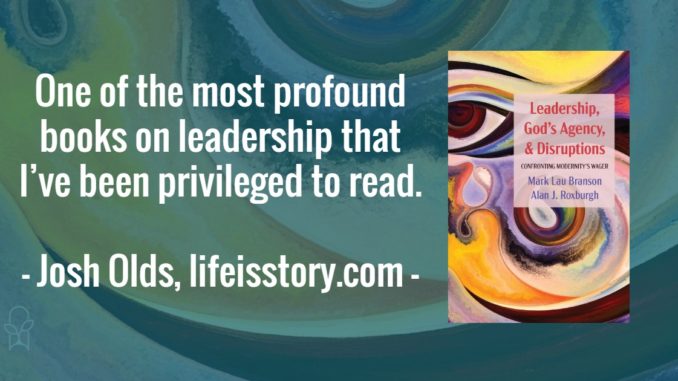
Also by this author: Churches Cultures and Leadership: A Practical Theology of Congregations and Ethnicities
Published by Cascade Books on February 16, 2021
Genres: Academic, Non-Fiction, Leadership, Theology
Buy on Amazon
Goodreads

Leaders in congregations and Christian organizations wrestle with an unraveling of the world in which they have little experience and training. While they are offered unending resources by experts on leadership, some with claims to biblical blueprints, the challenges seem mismatched to those methods. Branson and Roxburgh frame the situation as one in which “modernity’s wager”—the conviction that God is not necessary for life and wisdom and meaning—has defined the Western imagination. Because churches and leaders are colonized by this ethos, even when God is named and beliefs are claimed, approaches to leadership are blind to God’s agency. Branson and Roxburgh approach this challenge as a work in practical theology, attending to our cultural context, narratives of God’s disruptive initiatives in Scripture, and a reshaping of leadership theories with a priority on God’s agency. With years of experience as teachers, consultants, and guides, they name practices which lead to more faithful participation. Leadership, God’s Agency, and Disruptions is wide-ranging in cultural and biblical scholarship, challenging in its engagement with numerous leadership studies, and practical with its focus toward the on-the-ground life of churches and organizations.
Leadership, God’s Agency, and Disruptions is one of the most profound books on leadership that I’ve been privileged to read. Mark Branson and Alan Roxburgh develop a theology of leadership that stands apart as unique among the glut of leadership books currently in print. At the heart of the book is the assertion that much of church leadership and function has given into “modernity’s wager,” defined as the conviction that life can be lived well without God. Second, they contend that the professionalization of work culture, while not without its benefits, extended improperly to the church community so that pastors and church leaders became professionals more than participants in their communities. As such, the experience of God as primary agent becomes a lofty but meaningless goal as the real goals that churches seek are rooted in consumerism and pragmatic success.
By way of introduction, Branson and Roxburgh presents example of the church in disruption: Israel at the time of Jeremiah, the early church in the book of Acts, and the challenges in the Ephesian church. These disruptions were challenges and opportunities to a new way of worship, service, and engaging in community. Disruption becomes a key element in growth.
From here, the authors return to “modernity’s wager” to sketch a brief history of what they term “Euro-tribal” churches and connect the rise of modernity and the West with the politicization of Christendom. This history shows how Christianity was misused for ethnocentric and nationalistic ends and miscontextualized to allow for heinous evils like slavery and colonization. These chapters set the context in which the Christian leader is placed: We are in a disruption of our own making. The Euro-tribal church is failing because its foundation is set in early modernity’s European reformations and colonizations. As such, there is a need to right the wrongs of Christianity’s past and move forward anew.
The third chapter, then, forges ahead with a discussion of what it means to be human, what it means to be a priest of God, and what it means to be made in his image. It’s a deep, nuanced, complex discussion that needs to be read several times over to grasp in any depth. More than just a book on leadership, Leadership, God’s Agency, and Disruptions is about a new kind of humanity—and thus a new kind of community of church.
The second part of the book is less philosophical and instead focusing on building a theology of leadership as developed through several different narratives. Any one of these chapters is well worth the cost of the book. Branson and Roxburgh dive into the context of Jeremiah, Jesus as seen through Matthew, Acts, and Ephesians to build their leadership theology. Along the way, they focus on elements that go well beyond the typical verses used in leadership texts, creating a robust and nuanced discussion of the role of the leader.
The third of the book moves back to the philosophical, focusing on the linguistic. The authors talk about several different metaphors used in leadership, what they mean, and why the stories those metaphors create are important. Of particular interest was their discussion on “the clergy industry,” which detailed how a complex system of denominations, church networks, seminary training schools, conferences, money-sourcing foundations (underwriting the clergy profession), and congregations—all of whom assume there is a central “product” needed to serve the church, which is generally understood to be the “pastor” or “clergy” whose role is to “minister” to people in a variety of ways. Leadership, God’s Agency, and Disruptions challenges this by saying that Scripture sees the formation of communities, not just leaders—because every believer is to be a priest and leader within the church.
In the end, what Branson and Roxburgh call us to is a new way of doing church and I just want to close with their words:
Making a path as we walk means we don’t need to tell people where they need to be. Rather than vision-casting, the walk begins with the stories of the people with whom we dwell. Start by seeking out those in a congregation who sense the old roads aren’t repairable and, in the spirit of an interpretive leader, accompany them as fellow travelers.
In other words, cut through all the academic talk and philosophizing and it boils down to this: engage in community. Be a friend. Leadership, God’s Agency, and Disruptions is not an easy text. It’s deep and daunting, but the journey is worth it.
